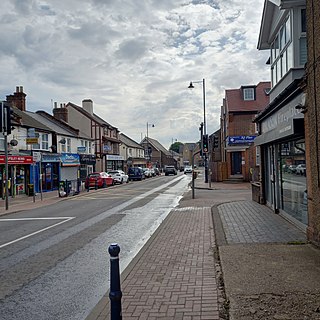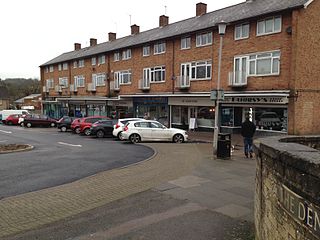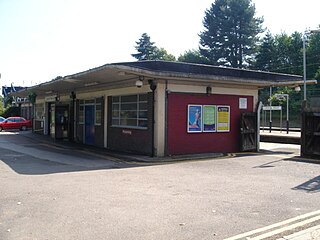
Apsley Mill was a paper mill at Apsley, near Hemel Hempstead, Hertfordshire, United Kingdom.

Apsley Mill was a paper mill at Apsley, near Hemel Hempstead, Hertfordshire, United Kingdom.
There was originally a corn-mill recorded in the Domesday Book. [1]
The mill was converted to papermaking by George Stafford in 1778, and was purchased by John Dickinson in 1809. [1] At Apsley Mill, Dickinson installed a new kind of paper machine, the Cylinder Mould Machine. Rather than pouring a dilute pulp suspension onto an endlessly revolving flat wire, this machine used a cylinder covered in wire as the mould. A cylindrical mould is partially submerged in the vat, containing a pulp suspension, and then, as the mould rotates, the water is sucked through the wire, leaving a thin layer of fibres deposited on the cylinder. [2] The mill supplied cartridge paper for the British Army during the Napoleonic Wars, [3] and produced envelopes, cards, ledgers and railway tickets, rather than paper, from 1888. [1] The stationery products were branded Basildon Bond, Three Candlesticks, Lion Brand and Challenge Notebooks. [4]
During the 1930s, the site became a vast industrial complex with the building now known as Apsley Mill Cottage, with its oak-panelled boardroom, at its centre. [5] [6] Following a change in ownership, Apsley Mill ceased the manufacture of stationery in 1999. [7]
The war memorial, which is a grade II listed building, [8] and Apsley Mill Cottage, which is also grade II listed, are all that remains of Apsley Mill. [3] The remainder of the site is now occupied by Apsley Mills Retail Park (to the northwest), [9] by residential developments and the Paper Mill public house, operated by Fuller's, (behind) [10] and by the Holiday Inn Express Hemel Hempstead to the southeast. [11]

Papermaking is the manufacture of paper and cardboard, which are used widely for printing, writing, and packaging, among many other purposes. Today almost all paper is made using industrial machinery, while handmade paper survives as a specialized craft and a medium for artistic expression.

Hemel Hempstead is a town in the Dacorum district in Hertfordshire, England. It is 24 miles (39 km) northwest of London. The population at the 2011 census was 97,500.

The pulp and paper industry comprises companies that use wood as raw material and produce pulp, paper, paperboard, and other cellulose-based products.

Apsley is a village in Hertfordshire, England, in a valley of the Chiltern Hills below the confluence of the River Gade and Bulbourne. It was the site of water mills serving local agriculture and from the early 19th century became an important centre for papermaking. Today it is a suburb of Hemel Hempstead.

A paper mill is a factory devoted to making paper from vegetable fibres such as wood pulp, old rags, and other ingredients. Prior to the invention and adoption of the Fourdrinier machine and other types of paper machine that use an endless belt, all paper in a paper mill was made by hand, one sheet at a time, by specialized laborers.

Dacorum is a local government district with borough status in Hertfordshire, England. The council is based in Hemel Hempstead. The borough also includes the towns of Berkhamsted and Tring and surrounding villages. The borough had a population of 155,081 in 2021. Dacorum was created in 1974 and is named after the ancient hundred of Dacorum which had covered a similar area. The borough of Dacorum is the westernmost of Hertfordshire's ten districts. It borders St Albans, Three Rivers, Buckinghamshire and Central Bedfordshire.

A paper machine is an industrial machine which is used in the pulp and paper industry to create paper in large quantities at high speed. Modern paper-making machines are based on the principles of the Fourdrinier Machine, which uses a moving woven mesh to create a continuous paper web by filtering out the fibres held in a paper stock and producing a continuously moving wet mat of fibre. This is dried in the machine to produce a strong paper web.

John Dickinson invented a continuous mechanised papermaking process. He established in 1809 the English paper and stationery producer Longman & Dickinson, which later evolved into John Dickinson Stationery.

Nash Mills is a civil parish within Hemel Hempstead and Dacorum Borough Council on the northern side of the Grand Union Canal, formerly the River Gade, and in the southernmost corner of Hemel Hempstead. There is evidence of a mill in this location since the 11th century and the row of 16th century mill cottages still remain. John Dickinson established a number of papermaking mills in the area in the 19th century.

Hemel Hempstead Town Football Club is a semi-professional football club based in Hemel Hempstead, Hertfordshire, England. Affiliated to the Hertfordshire County Football Association, they are currently members of the National League South and play at Vauxhall Road.

Hemel Hempstead is a constituency in Hertfordshire represented in the House of Commons of the Parliament of the United Kingdom. It elects one Member of Parliament (MP) by the first-past-the-post system. Since 2005, it has been represented by Mike Penning, a member of the Conservative Party.

Apsley railway station is in Apsley, on the southern outskirts of Hemel Hempstead, Hertfordshire, England. One of two railway stations now serving the town, the other is Hemel Hempstead just up the line in Boxmoor.

Nash Mill was a paper mill near Hemel Hempstead, Hertfordshire, United Kingdom. The local residential area takes its name from the mill.

John Dickinson Stationery Limited was a leading English stationery company founded in southwest Hertfordshire. In the 19th century, the company pioneered a number of innovations in papermaking. It became part of Dickinson Robinson Group in 1966; after changes of ownership, the John Dickinson brand was retired in 2008.

The River Gade is a river running almost entirely through Hertfordshire. It rises from a spring in the chalk of the Chiltern Hills at Dagnall, Buckinghamshire and flows through Hemel Hempstead, Kings Langley, then along the west side of Watford through Cassiobury Park. After passing Croxley Green it reaches Rickmansworth, where it joins the River Colne. For its whole course the Gade is unnavigable.

Wove paper is a type of paper first created centuries ago in the Orient, and subsequently introduced to England, Europe and the American colonies in the mid-eighteenth century. Hand-made wove paper was first produced by using a wooden mould that contained a finely-woven brass vellum, upon which the paper pulp was applied and dried, creating a smooth, uniform surface.

This article gives brief information on schools that cater for pupils up to the age of 11 in the Dacorum district of Hertfordshire, England. Most are county maintained primary schools, sometimes known as "junior mixed infant" (JMI). A small number are voluntary aided church schools or independent (fee-paying). The Local Education Authority is Hertfordshire County Council.
George Longman (1776-1822), of 22 Bloomsbury Square, Middlesex, was a politician.

Frogmore Paper Mill is a working paper mill situated in Apsley, Hertfordshire, near Hemel Hempstead. The mill is on an island in the River Gade, which forms part of the Grand Union Canal. It is the oldest mechanical paper mill in the world.

Apsley Marina, also referred to as Apsley Lock Marina, is a basin used for mooring narrowboats on the east side of the Grand Union Canal at Apsley, Hertfordshire, England.